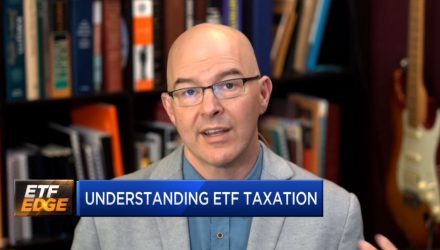It’s almost (2020’s) Tax Day and Dave Nadig, CIO and Director of Research at ETF Trends, explains how ETFs are taxed and lays out what investors should watch with Tax Day approaching on this week’s “ETF Edge,” with host Bob Pisani of CNBC.
To begin with, Nadig starts by addressing why ETFs are more tax-efficient, noting how it comes down to the obvious. Investors are running a portfolio, buying and selling stocks or bonds. So, with an ETF, they don’t buy securities. Generally, they get them in a creation unit, and the same thing happens when getting rid of the securities; they go out in a redemption.
Doing all of this means constantly resetting the basis of the fund, which means when getting to the end of the year, they haven’t realized any capital gains inside the fund that they have to pass out. Due to this, the vast majority of ETFs never make a capital gains distribution, particularly if they’re index-based. So the gains that are being paid are the ones the investor decides to sell, which is generally just more fair.
As Nadig states, “There’s no avoidance here, they’re simply deferring the tax event for when you, the investor, make the decision. That’s why ETFs continue to have this tax advantage.”
Regarding other areas to be careful with, such as collectibles, Nadig notes how nothing else has changed. The IRS generally taxes ETFs based on what they own, so if the investor’s fund only owns gold, it will be taxed as if they just purchased bullion, and that means, no matter how long it is held, there’s going to be a 28% tax to pay on that gain, which is the collectibles tax.
When it comes to more complicated areas, such as MLPs, Nadig notes how it would likely be better to get some better or more professional advice. However, he also notes how the ETF structure is still the most effective way to own those kinds of investments.
Nadig continues, “If you’re going to do some sort of trading activity where you’re going to generate gains on your own, or if you’re going to own something like an actively managed mutual fund that trades all the time, and is going to throw off capital gains, do that in your 401K or your IRA rollover. For your money that you’re keeping in a taxable account, keep that in ETFs.”
Watch Dave Nadig Talk Tax Day On CNBC:
For more market trends, visit ETF Trends.
